Square-jawed, craggy-looking Jack Hawkins (1910-1973) was an English actor who worked on stage and in film from the 1930s until the 1970s. One of the most popular British film stars of the 1950s, he often played coolly efficient military officers in such films as The Cruel Sea (1953), Bridge on the River Kwai (1957), and Lawrence of Arabia (1962).
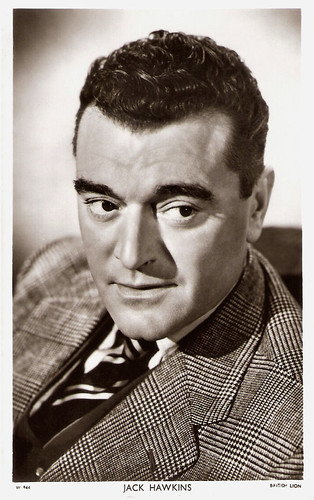
British postcard in the Picturegoer series, no. W 44. Photo: British Lion.
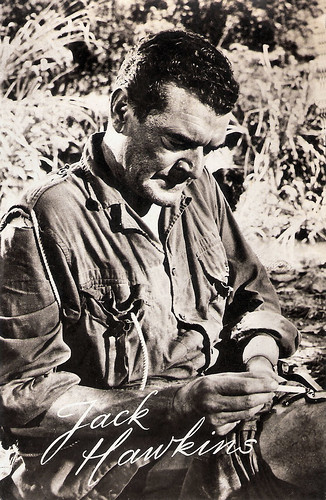
Dutch postcard by Uitg. Takken, Utrecht, no. 8304. Photo: Columbia. Photo: The Bridge on the River Kwai (David Lean, 1957).
John Edward ‘Jack’ Hawkins was born in London in 1910. He was the youngest child to Thomas George Hawkins, a master builder and Phoebe (nee Goodman). He was educated at Wood Green’s Trinity County Grammar School, where, aged eight, he joined the school choir. By the age of ten, his singing had developed so well that he had joined the local operatic society, making his stage debut in 'Patience' by Gilbert and Sullivan. His parents enrolled him in the Italia Conti Academy and whilst he was studying there he made his London stage debut, when aged eleven, playing the Elf King in Where the Rainbow Ends, a Christmas pantomime that also included the young Noël Coward.
The following year, aged 14, he played the page in a production of 'Saint Joan' by George Bernard Shaw. Five years later he was in a production of Beau Geste alongside Laurence Olivier. By the age of 18, he appeared on Broadway as Second Lieutenant Hibbert in R. C. Sherriff’s 'Journey’s End', directed by James Whale. At 21, he was back in London playing a young lover in 'Autumn Crocus'. He married his leading lady, Jessica Tandy.
In the 1930s, Jack Hawkins' focus was on the stage. He worked in the companies of Sybil Thorndike, John Gielgud and Basil Dean. His performances included 'Port Said' by Emlyn Williams (1931), 'Below the Surface' by HL Stoker and LS Hunt (1932), 'Red Triangle' by Val Gielgud (1932), 'Service by CI Anthony', for director Basil Dean (1933), 'One of Us' by Frank Howard, 'As You Like It' by William Shakespeare (1933) and 'Iron Flowers' by Cecil Lewis (1933), with his wife Jessica Tandy.
He started appearing in films, predominantly ‘quota quickies’ of the time, including an uncredited bit role in the mystery Birds of Prey (Basil Dean, 1930), his first proper role in the sound version of Alfred Hitchcock's The Lodger (Maurice Elvey, 1932), starring Ivor Novello, the comedy The Good Companions (Victor Saville, 1933), and the romance Autumn Crocus (Basil Dean, 1934).
Stage roles included 'Iron Mistress' (1934) by Arthur Macrae; and then an open-air Shakespeare Festival - 'As You Like It' (1934) with Anna Neagle, 'Twelfth Night' (1934), and 'Comedy of Errors' (1934). In the years leading up to the Second World War, he often worked with John Gielgud, most notably in the 1940 production of Oscar Wilde’s 'The Importance of Being Earnest', in which Hawkins excelled in the role of Algernon Moncrieff. Films in the late 1930s included the comedy Beauty and the Barge (Henry Edwards, 1937) with Gordon Harker, the crime film The Frog (Jack Raymond, 1937), the war film Who Goes Next? (Maurice Elvey, 1938), and the crime film The Flying Squad (Herbert Brenon, 1940).
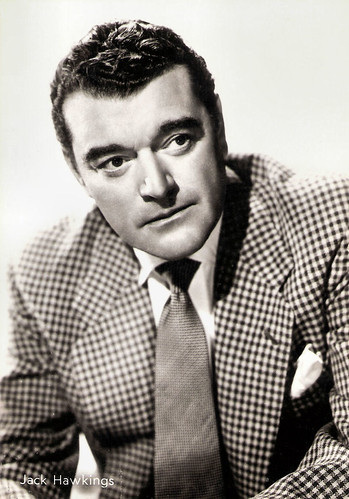
Italian postcard by Bromostampa, Milano, no. 78.
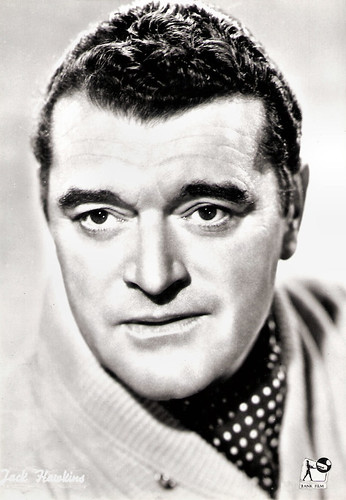
Italian postcard by Bromofoto, Milano, no. 1288. Photo: Rank Film. Publicity still for The Long Arm (Charles Frend, 1956).
During World War II, Jack Hawkins volunteered as an officer with the Royal Welch Fusiliers. He spent most of his military career arranging entertainment for the British forces in India. One of the actresses who came out to India was Doreen Lawrence who became his second wife after the war. During his military service, he made The Next of Kin (Thorold Dickenson, 1942) for Ealing Studios.
Hawkins left the army in July 1946. Two weeks later he appeared on stage in The Apple Cart at ten pounds a week. The following year he starred in Othello, to a mixed reception. Hawkins's wife became pregnant and he became concerned about his future. He decided to accept a contract with Alexander Korda for three years at £50 a week. Hawkins had been recommended to Korda by the latter's production executive, Bill Bryden, who was married to Elizabeth Allen, who had worked with Hawkins. The association began badly when Hawkins was cast in Korda's notorious flop Bonnie Prince Charlie (Anthony Kimmins, 1948) as Lord George Murray.
However, he followed it with a good role in the successful, highly acclaimed The Fallen Idol (1948) for Carol Reed. He played Detective Ames opposite Ralph Richardson. Also acclaimed was the war-time thriller The Small Back Room (1949), for Powell and Pressburger. Hawkins then impressed as the villain in State Secret (Sidney Gilliat, 1950), with Douglas Fairbanks Jr. He was hired by 20th Century Fox to support Tyrone Power and Orson Welles in an expensive historical epic, The Black Rose (Henry Hathaway, 1950).
He made another film with Powell and Pressburger for Korda, The Elusive Pimpernel (1950), playing The Prince of Wales. Hawkins played the lead in The Adventurers (David MacDonald, 1951), shot in South Africa, and then he had a good role in another Hollywood-financed film shot in England, No Highway in the Sky (Henry Koster, 1951), with James Stewart. It was followed by a British thriller directed by and starring Ralph Richardson, Home at Seven (1952). In the spring of 1951, he went to Broadway and played Mercutio in a production of Romeo and Juliet with Olivia de Havilland.
Hawkins became a star with the release of three successful films in which he played stern but sympathetic authority figures: Angels One Five (George More O'Ferrall, 1951), as an RAF officer during the war; The Planter's Wife (Ken Annakin, 1952), as a rubber planter combating communists in the Malayan Emergency with Claudette Colbert; and Mandy (Alexander Mackendrick, 1952), the gruffly, humane headmaster of a school for deaf children. All films ranked among the top ten most popular films at the British box office in 1952 and British exhibitors voted him the fourth most popular British star at the local box office.
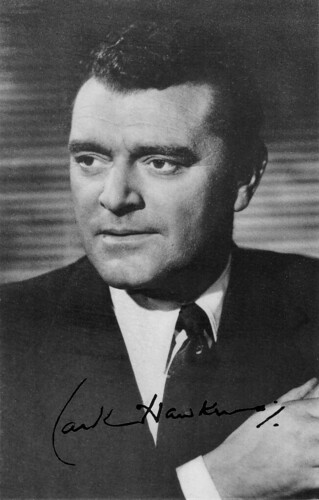
British postcard by L.D. LTD., London, in the Film Star Autograph Portrait series, no. 96. Photo: J. Arthur Rank Organisation LTD. Publicity still for The Seekers (Ken Annakin, 1954).
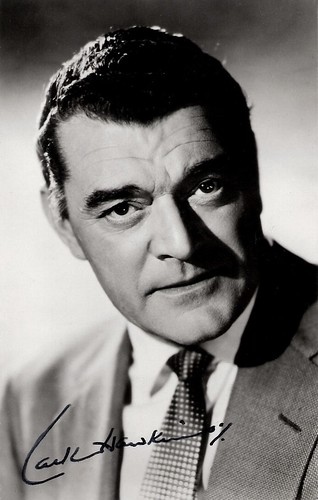
British autograph card.
Jack Hawkins consolidated his new status with The Cruel Sea (Charles Frend, 1953). Suffering from lifelong real-life sea sickness, he played the driven Captain Ericson of the Compass Rose, a naval officer during the war. Clive Saunders at BritMovie: “The film is a triumph as an unsentimental depiction of the ugly realities of war at sea, the hardships the crews go through, their highs and lows together, the sense of pride when the job is done. Hawkins is superb as the Captain of the Corvette, Saltash Castle, tasked with protecting the convoys, and gives a vivid portrayal of a man with the heavy responsibility of making life-or-death decisions that affect hundreds of his colleagues.”
The Cruel Sea was the most successful film of the year and saw Hawkins voted the most popular star in Britain regardless of nationality. Malta Story (Alexander Mackendrick, 1953) was another military story, with Hawkins as an RAF officer in the Siege of Malta during the war. It too was a hit, the ninth most popular film in Britain in 1953. He had a guest role in Twice Upon a Time (1953) for Emeric Pressburger. The Seekers (Ken Annakin, 1954) was partly shot in New Zealand and cast Hawkins in a rare romantic role. It was followed by The Prisoner (Peter Glenville, 1955), an unconventional drama, playing the interrogator of a priest (Alec Guinness). None of these films were that successful but Hawkins was still voted the fifth biggest star at the British box office for 1954, and the most popular British one.
Hawkins received a Hollywood offer to play a pharaoh in Land of the Pharaohs (Howard Hawks, 1955). He returned home to make an Ealing comedy, Touch and Go (Michael Truman, 1955), which was not particularly popular. He was more comfortably cast as a police officer in The Long Arm (Charles Frend, 1956) and a test pilot in The Man in the Sky (Charles Crichton, 1957). He was an insurance investigator in Sidney Gilliat's Fortune Is a Woman (1957). Hawkins's career received a major boost when given the third lead in The Bridge on the River Kwai (David Lean, 1957), supporting William Holden and Alec Guinness as Major Warden, the fervent demolition expert. This was a massive hit and highly acclaimed. Clive Saunders: “Hawkins was somewhat unlucky not to win either of the Best Supporting Actor Awards for his portrayal of the determined and indomitable explosives expert, played with the archetypal ‘stiff-upper-lip, jolly good show’ attitude of a British officer, intent on completing his mission at all costs.”
Hawkins next played the lead role of Inspector George Gideon, the overworked police detective in Gideon's Day/Gideon of Scotland Yard (John Ford, 1958). He had a good role as a double agent in a war film, The Two-Headed Spy (Andre de Toth, 1958) then was given another third lead in a Hollywood blockbuster Ben-Hur (William Wyler, 1959), playing the Roman soldier who befriends Ben-Hur (Charlton Heston). Melinda Hildebrandt in the Encyclopedia of British Film: “his most commanding turn of all, Quintus Arrius.” Ben-Hur was even more successful than The Bridge on the River Kwai. In 1958, Hawkins was awarded the CBE (Commander of the Order of the British Empire) in the Queen's Birthday Honours List for his services to drama. He appeared as one of The Four Just Men (1959) in the Sapphire Films TV series for ITV, one of the most ambitious British TV series ever made.
In sharp contrast to his conservative screen image, Jack Hawkins was politically liberal, and an emotional man. One of his favourite films, the heist movie The League of Gentlemen (Basil Dearden, 1960), was considered quite groundbreaking for its time in its references to sex. The film was popular at the British box office. He was initially sought for the role of a gay barrister in Victim (Basil Dearden, 1960), the ground-breaking film examining the persecution and blackmail of homosexuals. Reportedly, Hawkins turned it down fearing that it might conflict with his masculine image. The role was eventually played by Dirk Bogarde.
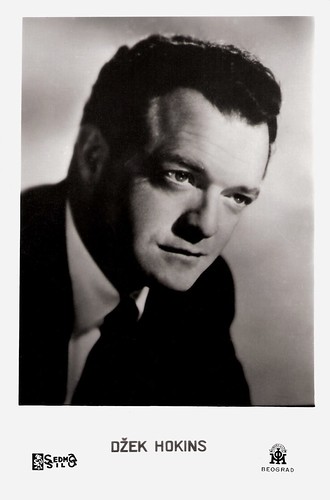
Yugoslavian postcard by Sedmo Silo / IOM, Beograd.
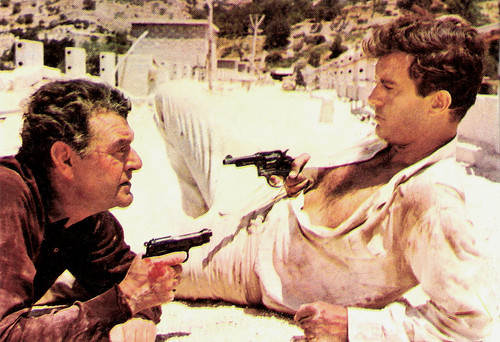
Italian postcard. Photo: Dear Film. Publicity still for Masquerade (Basil Dearden, 1965).
A three-packet-a-day chain smoker, Jack Hawkins began experiencing voice problems in the late 1950s. Unknown to the public he had undergone cobalt treatment in 1959 for what was then described as a secondary condition of the larynx, but which was probably cancer. Hawkins became worried about his voice and was concerned he would lose it. This caused him to take any work going. This may explain why he took the part of General Cornwallis in the French-Italian biographical epic Lafayette (Jean Dréville, 1961). He was the third lead to Shirley MacLaine and Laurence Harvey in Two Loves (Charles Walters, 1961), and supported Rosalind Russell in Five Finger Exercise (Daniel Mann, 1962).
He was in another big hit, Lawrence of Arabia (David Lean, 1962), as General Allenby. Zulu (Cy Endfield, 1964) gave him a good role as Otto Witt, a pacifist missionary with a drinking problem, continually imploring Stanley Baker‘s men to lay down their arms or die. It was however clearly a support part and Hawkins' days as a star seemed to be over. He had supporting parts in Guns at Batasi (John Guillermin, 1964) and Lord Jim (Richard Brooks, 1965). In December 1965, Hawkins was diagnosed with throat cancer. His entire larynx was removed in January 1966. In March of that year, he appeared at a royal screening of Born Free attended by Queen Elizabeth II and received a standing ovation. Thereafter his performances were dubbed, often (with Hawkins's approval) by Robert Rietti or Charles Gray. Hawkins continued to smoke after losing his voice. In private, he used a mechanical larynx to aid his speech.
He resumed his acting career, with his voice dubbed and dialogue kept to a minimum: Shalako (Edward Dmytryk, 1968) with Sean Connery and Brigitte Bardot, Great Catherine (Gordon Flemyng, 1968) featuring Jeanne Moreau, and the musical Oh! What a Lovely War (Richard Attenborough, 1969). He had an operation to restore his voice in 1968. It did not work; Hawkins could talk but it was in a croaking voice. Some rare comedies followed: Monte Carlo or Bust (Ken Annakin, 1969), Twinky (Richard Donner, 1970), and The Adventures of Gerard (Jerzy Skolimowski, 1970). More typical were Waterloo (Sergei Bondarchuk, 1970), When Eight Bells Toll (Etienne Perier, 1971) with Anthony Hopkins, Nicholas and Alexandra (Franklin J. Schaffner, 1971) and Kidnapped (Delbert Mann, 1971) with Michael Caine.
The Last Lion (Elmo De Witt, 1972), shot in South Africa, offered him a rare lead. It was followed by Young Winston (Richard Attenborough, 1972), Escape to the Sun (Menahem Golan, 1972), and the horror film Tales That Witness Madness (Freddie Francis, 1973). In his last major part, that of Solomon Psaltery in the comedy-horror Theatre of Blood (Douglas Hickox, 1973), he was very cleverly cast in a substantial role that required no dialogue whatsoever. It was so well conceived that the viewer never realises this. Hawkins also produced the film adaptation of Peter Barnes's The Ruling Class (Peter Medak, 1972), with Peter O'Toole and Alastair Sim.
In May 1973, Jack Hawkins undertook an experimental operation on his throat to insert an artificial voicebox. He started haemorrhaging and was admitted to a hospital, forcing him to drop out of The Tamarind Seed (Blake Edwards, 1974), in which Hawkins was to have played a Russian general. Jack Hawkins died in 1973 of a secondary haemorrhage. He was 62. His final appearance was in the television miniseries QB VII. Ironically, Hawkins' biography was titled Anything for a Quiet Life. It was published after his death. Jack Hawkins was married to Jessica Tandy from 1932 to 1940 and later to Doreen Lawrence from 1947 until he died in 1973. He had a daughter, Susan, with Tandy and two sons, Nicholas and Andrew, with Lawrence.
Trailer The Bridge on the River Kwai (David Lean, 1957). Source: Dubbing Studio (YouTube).
Sources: Clive Saunders (BritMovie - page now defunct), Melinda Hildebrandt (Encyclopedia of British Film), Hal Erickson (AllMovie - page now defunct), Dale O'Connor (IMDb), Wikipedia, and IMDb.
This post was last updated on 28 August 2024.

British postcard in the Picturegoer series, no. W 44. Photo: British Lion.

Dutch postcard by Uitg. Takken, Utrecht, no. 8304. Photo: Columbia. Photo: The Bridge on the River Kwai (David Lean, 1957).
Journey's end
John Edward ‘Jack’ Hawkins was born in London in 1910. He was the youngest child to Thomas George Hawkins, a master builder and Phoebe (nee Goodman). He was educated at Wood Green’s Trinity County Grammar School, where, aged eight, he joined the school choir. By the age of ten, his singing had developed so well that he had joined the local operatic society, making his stage debut in 'Patience' by Gilbert and Sullivan. His parents enrolled him in the Italia Conti Academy and whilst he was studying there he made his London stage debut, when aged eleven, playing the Elf King in Where the Rainbow Ends, a Christmas pantomime that also included the young Noël Coward.
The following year, aged 14, he played the page in a production of 'Saint Joan' by George Bernard Shaw. Five years later he was in a production of Beau Geste alongside Laurence Olivier. By the age of 18, he appeared on Broadway as Second Lieutenant Hibbert in R. C. Sherriff’s 'Journey’s End', directed by James Whale. At 21, he was back in London playing a young lover in 'Autumn Crocus'. He married his leading lady, Jessica Tandy.
In the 1930s, Jack Hawkins' focus was on the stage. He worked in the companies of Sybil Thorndike, John Gielgud and Basil Dean. His performances included 'Port Said' by Emlyn Williams (1931), 'Below the Surface' by HL Stoker and LS Hunt (1932), 'Red Triangle' by Val Gielgud (1932), 'Service by CI Anthony', for director Basil Dean (1933), 'One of Us' by Frank Howard, 'As You Like It' by William Shakespeare (1933) and 'Iron Flowers' by Cecil Lewis (1933), with his wife Jessica Tandy.
He started appearing in films, predominantly ‘quota quickies’ of the time, including an uncredited bit role in the mystery Birds of Prey (Basil Dean, 1930), his first proper role in the sound version of Alfred Hitchcock's The Lodger (Maurice Elvey, 1932), starring Ivor Novello, the comedy The Good Companions (Victor Saville, 1933), and the romance Autumn Crocus (Basil Dean, 1934).
Stage roles included 'Iron Mistress' (1934) by Arthur Macrae; and then an open-air Shakespeare Festival - 'As You Like It' (1934) with Anna Neagle, 'Twelfth Night' (1934), and 'Comedy of Errors' (1934). In the years leading up to the Second World War, he often worked with John Gielgud, most notably in the 1940 production of Oscar Wilde’s 'The Importance of Being Earnest', in which Hawkins excelled in the role of Algernon Moncrieff. Films in the late 1930s included the comedy Beauty and the Barge (Henry Edwards, 1937) with Gordon Harker, the crime film The Frog (Jack Raymond, 1937), the war film Who Goes Next? (Maurice Elvey, 1938), and the crime film The Flying Squad (Herbert Brenon, 1940).

Italian postcard by Bromostampa, Milano, no. 78.

Italian postcard by Bromofoto, Milano, no. 1288. Photo: Rank Film. Publicity still for The Long Arm (Charles Frend, 1956).
The fourth most popular British star
During World War II, Jack Hawkins volunteered as an officer with the Royal Welch Fusiliers. He spent most of his military career arranging entertainment for the British forces in India. One of the actresses who came out to India was Doreen Lawrence who became his second wife after the war. During his military service, he made The Next of Kin (Thorold Dickenson, 1942) for Ealing Studios.
Hawkins left the army in July 1946. Two weeks later he appeared on stage in The Apple Cart at ten pounds a week. The following year he starred in Othello, to a mixed reception. Hawkins's wife became pregnant and he became concerned about his future. He decided to accept a contract with Alexander Korda for three years at £50 a week. Hawkins had been recommended to Korda by the latter's production executive, Bill Bryden, who was married to Elizabeth Allen, who had worked with Hawkins. The association began badly when Hawkins was cast in Korda's notorious flop Bonnie Prince Charlie (Anthony Kimmins, 1948) as Lord George Murray.
However, he followed it with a good role in the successful, highly acclaimed The Fallen Idol (1948) for Carol Reed. He played Detective Ames opposite Ralph Richardson. Also acclaimed was the war-time thriller The Small Back Room (1949), for Powell and Pressburger. Hawkins then impressed as the villain in State Secret (Sidney Gilliat, 1950), with Douglas Fairbanks Jr. He was hired by 20th Century Fox to support Tyrone Power and Orson Welles in an expensive historical epic, The Black Rose (Henry Hathaway, 1950).
He made another film with Powell and Pressburger for Korda, The Elusive Pimpernel (1950), playing The Prince of Wales. Hawkins played the lead in The Adventurers (David MacDonald, 1951), shot in South Africa, and then he had a good role in another Hollywood-financed film shot in England, No Highway in the Sky (Henry Koster, 1951), with James Stewart. It was followed by a British thriller directed by and starring Ralph Richardson, Home at Seven (1952). In the spring of 1951, he went to Broadway and played Mercutio in a production of Romeo and Juliet with Olivia de Havilland.
Hawkins became a star with the release of three successful films in which he played stern but sympathetic authority figures: Angels One Five (George More O'Ferrall, 1951), as an RAF officer during the war; The Planter's Wife (Ken Annakin, 1952), as a rubber planter combating communists in the Malayan Emergency with Claudette Colbert; and Mandy (Alexander Mackendrick, 1952), the gruffly, humane headmaster of a school for deaf children. All films ranked among the top ten most popular films at the British box office in 1952 and British exhibitors voted him the fourth most popular British star at the local box office.

British postcard by L.D. LTD., London, in the Film Star Autograph Portrait series, no. 96. Photo: J. Arthur Rank Organisation LTD. Publicity still for The Seekers (Ken Annakin, 1954).

British autograph card.
The bridge on the river Kwai
Jack Hawkins consolidated his new status with The Cruel Sea (Charles Frend, 1953). Suffering from lifelong real-life sea sickness, he played the driven Captain Ericson of the Compass Rose, a naval officer during the war. Clive Saunders at BritMovie: “The film is a triumph as an unsentimental depiction of the ugly realities of war at sea, the hardships the crews go through, their highs and lows together, the sense of pride when the job is done. Hawkins is superb as the Captain of the Corvette, Saltash Castle, tasked with protecting the convoys, and gives a vivid portrayal of a man with the heavy responsibility of making life-or-death decisions that affect hundreds of his colleagues.”
The Cruel Sea was the most successful film of the year and saw Hawkins voted the most popular star in Britain regardless of nationality. Malta Story (Alexander Mackendrick, 1953) was another military story, with Hawkins as an RAF officer in the Siege of Malta during the war. It too was a hit, the ninth most popular film in Britain in 1953. He had a guest role in Twice Upon a Time (1953) for Emeric Pressburger. The Seekers (Ken Annakin, 1954) was partly shot in New Zealand and cast Hawkins in a rare romantic role. It was followed by The Prisoner (Peter Glenville, 1955), an unconventional drama, playing the interrogator of a priest (Alec Guinness). None of these films were that successful but Hawkins was still voted the fifth biggest star at the British box office for 1954, and the most popular British one.
Hawkins received a Hollywood offer to play a pharaoh in Land of the Pharaohs (Howard Hawks, 1955). He returned home to make an Ealing comedy, Touch and Go (Michael Truman, 1955), which was not particularly popular. He was more comfortably cast as a police officer in The Long Arm (Charles Frend, 1956) and a test pilot in The Man in the Sky (Charles Crichton, 1957). He was an insurance investigator in Sidney Gilliat's Fortune Is a Woman (1957). Hawkins's career received a major boost when given the third lead in The Bridge on the River Kwai (David Lean, 1957), supporting William Holden and Alec Guinness as Major Warden, the fervent demolition expert. This was a massive hit and highly acclaimed. Clive Saunders: “Hawkins was somewhat unlucky not to win either of the Best Supporting Actor Awards for his portrayal of the determined and indomitable explosives expert, played with the archetypal ‘stiff-upper-lip, jolly good show’ attitude of a British officer, intent on completing his mission at all costs.”
Hawkins next played the lead role of Inspector George Gideon, the overworked police detective in Gideon's Day/Gideon of Scotland Yard (John Ford, 1958). He had a good role as a double agent in a war film, The Two-Headed Spy (Andre de Toth, 1958) then was given another third lead in a Hollywood blockbuster Ben-Hur (William Wyler, 1959), playing the Roman soldier who befriends Ben-Hur (Charlton Heston). Melinda Hildebrandt in the Encyclopedia of British Film: “his most commanding turn of all, Quintus Arrius.” Ben-Hur was even more successful than The Bridge on the River Kwai. In 1958, Hawkins was awarded the CBE (Commander of the Order of the British Empire) in the Queen's Birthday Honours List for his services to drama. He appeared as one of The Four Just Men (1959) in the Sapphire Films TV series for ITV, one of the most ambitious British TV series ever made.
In sharp contrast to his conservative screen image, Jack Hawkins was politically liberal, and an emotional man. One of his favourite films, the heist movie The League of Gentlemen (Basil Dearden, 1960), was considered quite groundbreaking for its time in its references to sex. The film was popular at the British box office. He was initially sought for the role of a gay barrister in Victim (Basil Dearden, 1960), the ground-breaking film examining the persecution and blackmail of homosexuals. Reportedly, Hawkins turned it down fearing that it might conflict with his masculine image. The role was eventually played by Dirk Bogarde.

Yugoslavian postcard by Sedmo Silo / IOM, Beograd.

Italian postcard. Photo: Dear Film. Publicity still for Masquerade (Basil Dearden, 1965).
Lawrence of Arabia
A three-packet-a-day chain smoker, Jack Hawkins began experiencing voice problems in the late 1950s. Unknown to the public he had undergone cobalt treatment in 1959 for what was then described as a secondary condition of the larynx, but which was probably cancer. Hawkins became worried about his voice and was concerned he would lose it. This caused him to take any work going. This may explain why he took the part of General Cornwallis in the French-Italian biographical epic Lafayette (Jean Dréville, 1961). He was the third lead to Shirley MacLaine and Laurence Harvey in Two Loves (Charles Walters, 1961), and supported Rosalind Russell in Five Finger Exercise (Daniel Mann, 1962).
He was in another big hit, Lawrence of Arabia (David Lean, 1962), as General Allenby. Zulu (Cy Endfield, 1964) gave him a good role as Otto Witt, a pacifist missionary with a drinking problem, continually imploring Stanley Baker‘s men to lay down their arms or die. It was however clearly a support part and Hawkins' days as a star seemed to be over. He had supporting parts in Guns at Batasi (John Guillermin, 1964) and Lord Jim (Richard Brooks, 1965). In December 1965, Hawkins was diagnosed with throat cancer. His entire larynx was removed in January 1966. In March of that year, he appeared at a royal screening of Born Free attended by Queen Elizabeth II and received a standing ovation. Thereafter his performances were dubbed, often (with Hawkins's approval) by Robert Rietti or Charles Gray. Hawkins continued to smoke after losing his voice. In private, he used a mechanical larynx to aid his speech.
He resumed his acting career, with his voice dubbed and dialogue kept to a minimum: Shalako (Edward Dmytryk, 1968) with Sean Connery and Brigitte Bardot, Great Catherine (Gordon Flemyng, 1968) featuring Jeanne Moreau, and the musical Oh! What a Lovely War (Richard Attenborough, 1969). He had an operation to restore his voice in 1968. It did not work; Hawkins could talk but it was in a croaking voice. Some rare comedies followed: Monte Carlo or Bust (Ken Annakin, 1969), Twinky (Richard Donner, 1970), and The Adventures of Gerard (Jerzy Skolimowski, 1970). More typical were Waterloo (Sergei Bondarchuk, 1970), When Eight Bells Toll (Etienne Perier, 1971) with Anthony Hopkins, Nicholas and Alexandra (Franklin J. Schaffner, 1971) and Kidnapped (Delbert Mann, 1971) with Michael Caine.
The Last Lion (Elmo De Witt, 1972), shot in South Africa, offered him a rare lead. It was followed by Young Winston (Richard Attenborough, 1972), Escape to the Sun (Menahem Golan, 1972), and the horror film Tales That Witness Madness (Freddie Francis, 1973). In his last major part, that of Solomon Psaltery in the comedy-horror Theatre of Blood (Douglas Hickox, 1973), he was very cleverly cast in a substantial role that required no dialogue whatsoever. It was so well conceived that the viewer never realises this. Hawkins also produced the film adaptation of Peter Barnes's The Ruling Class (Peter Medak, 1972), with Peter O'Toole and Alastair Sim.
In May 1973, Jack Hawkins undertook an experimental operation on his throat to insert an artificial voicebox. He started haemorrhaging and was admitted to a hospital, forcing him to drop out of The Tamarind Seed (Blake Edwards, 1974), in which Hawkins was to have played a Russian general. Jack Hawkins died in 1973 of a secondary haemorrhage. He was 62. His final appearance was in the television miniseries QB VII. Ironically, Hawkins' biography was titled Anything for a Quiet Life. It was published after his death. Jack Hawkins was married to Jessica Tandy from 1932 to 1940 and later to Doreen Lawrence from 1947 until he died in 1973. He had a daughter, Susan, with Tandy and two sons, Nicholas and Andrew, with Lawrence.
Trailer The Bridge on the River Kwai (David Lean, 1957). Source: Dubbing Studio (YouTube).
Sources: Clive Saunders (BritMovie - page now defunct), Melinda Hildebrandt (Encyclopedia of British Film), Hal Erickson (AllMovie - page now defunct), Dale O'Connor (IMDb), Wikipedia, and IMDb.
This post was last updated on 28 August 2024.
No comments:
Post a Comment